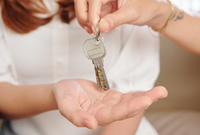How To Get Your Residential Rental Bond Back

With the rental market in Australia incredibly competitive, the last thing you want is a blemish on your rental record. That's why it’s critical you get your bond back in full when you leave your home. If a landlord or property manager refuses to release your security deposit, it will show in your rental history. Make sure you avoid this by employing the strategies below.
What Is a Rental Bond and When Do You Get It Back?
Your rental bond is a security deposit of typically four weeks' rent that you have to pay before moving in. Although paying it isn't mandatory, many landlords insist on it. Your landlord or property manager may collect it, but they don't keep it.
Instead, they will submit it to the state bond trust together with your papers. If you leave the property damaged or haven't paid rent or utility bills for any other reason, the landlord has the money to cover some (or hopefully all) of their losses.

How To Get Your Rental Bond Back
When renting a home for the first time, you may have a tough landlord or property management team to deal with. Here’s what to do.
1. Record Everything
Keep track of everything related to your rental property, including email trails and paperwork around fixing anything in the property. Keeping records can save hours of arguing about who’s right and what happened.
2. Hire A Bond Cleaner
Hiring a bond cleaner is a great option if you're not a fantastic cleaner or just want peace of mind. Bond cleaners ensure the property is completely clean to the landlord’s standard, so you get your full bond. You won't have to fix anything before getting your bond restored.
3. Demand An Entry-Exit Condition Report
Your landlord isn't helping you if they tell you to skip the entry and exit condition reports – make sure you complete these reports. Comment on anything missing from the images, take your own photos for your record, double-check everything and provide your photos with any discrepancies in entry and exit condition reports.
4. Track Rent and Bills
Keep note of your weekly, fortnightly and monthly rental payments to compare with your landlord's records. If they claim you owe them money you can check your records to corroborate. If your records show you’ve paid you can clear up any confusion with your property manager or landlord. Request a rental ledger to discover how much is owed and when.
Conclusion
Everyone has had to relocate at some point or another. You spend a lot of money when you move in, so you want to make sure you get your security deposit back when you leave the property.
Contact us today to speak with our team of property specialists.

Disclaimer: The information provided is for guidance only and does not replace independent business, legal and financial advice, which we strongly recommend. Whilst the information is considered true and correct at the date of publication, changes in circumstances after the time of publication may impact the accuracy of the information provided. PRD will not accept responsibility or liability for any reliance on the blog information, including but not limited to the accuracy, currency or completeness of any information or links.





